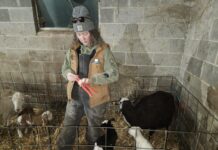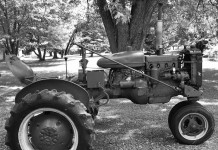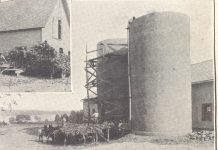As some of you may have gathered, I have an extensive collection of old farm magazines from the 1930s, ’40s, and ’50s. I like to read through these from time to time, and sometimes I pass along some of what I find interesting.
In the March 1940 issue of the Farm Journal and Farmer’s Wife were the following tidbits. “March is the month that takes a farmer’s measure. The sun climbs a little higher and comes a little nearer each day, as if to get a better look at the preparations you have made for planting. The snow retreats, the birds return, the sap starts to run, the soil begs for seed. Are you ready?”
Being hotly debated in Washington was a proposed “incentive plan” that would pay farmers to produce “those items now imported for which our soils and climate are adapted.”
Payments would also be made for growing crops for industrial or non-food purposes (the possibility of making plastic from soybeans had just been discovered), as well as for certain soil conservation and fertility-building practices.
Lard uses
The American Pork Producers met to discuss ways to increase the use of lard and lauded the number of Iowa school boards which had passed resolutions requiring the use of only lard in their home economics classes.
An 80-year-old Vermont farmer had a sale “to help pay my funeral expenses.” The sale bill, among other things, listed “one cow, about eight years old, the best cow … north of Mexico,” and ended with “There ain’t nothin’ else too numerous to mention.”
In the event, the cow brought $49 and the auction netted $240.20. The old man chortled, “What a funeral I’ll have!” and a local undertaker said, “He can have quite a respectable funeral for that sum.”
There was a story about the rise in the price of scrap metal due to wartime demand from Japan and the European countries, and talk about the benefits to farmers for cleaning up all the scrap on their farms and earning extra money. No one realized that, in less than two years, that scrap would be returned to the sons of those farmers in the form of bombs and artillery shells.
During January, “farmers in the Deep South (had) shivered and shoveled (a ten-inch blanket) of snow.” All of Florida’s Valencia oranges and two-thirds of her grapefruit were killed. Three-fourths of the Texas citrus and tomato crops were frozen. The only good came to cotton farmers who believed the freeze had killed lots of boll weevils.
Politics
The year 1940 was an election year and Farm Journal explained how Congress would appear to practice economy, all the while not cutting funds for popular programs. The House would vote for severe cuts while “Senators (would) speak loudly for economy, (and) vote quietly for appropriations.”
Conference committees would then restore remaining cuts wherever they meant votes, and later emergency appropriations would wipe out any further savings.
A letter from Vermont read: “When a government investigator drives 200 miles, spending the night at a good hotel, just to find out if Mr. Farmer paid tax on one pig he sold, (it’s) enough to make a he-man see red. When I look back (on) all the wonderful things Mr. Roosevelt (promised), and me, a true Vermonter, voting for him, and then study the mess he has got us into, (it’s) no wonder business men have indigestion and hearts stop suddenly.”
He ended optimistically with: “Well, there is always darkness before dawn. The country is not going to the dogs, nor shall we embrace Communism or any other false God.”
Census
The 1940 census was scheduled to start on April Fool’s Day. New census questions concerned farm tenant and landlord relationships, mortgage debt rates, hours spent on farm and off-farm work, farm labor, cooperative buying and selling, amount of money spent on gas, oil and building materials, and number of cars, trucks and tractors.
There were lots of questions about cropping practices, number of animals butchered, beehives, goats milked and a bunch of other very detailed questions.
Under new machinery was a crushing attachment for hay mowers. No manufacturer is given, but a photo shows the machine, powered by a small gas engine, with a pick-up reel and two large steel rollers, behind a horse-drawn hay mower.
Entertainment
The two top movies that month were Abe Lincoln in Illinois, starring Raymond Massey as Lincoln, and The Fighting 69th, a movie about World War I starring Jimmy Cagney “as a coward who finds his way to courage” and Pat O’Brien as Father Duffy.’
A Texas farm wife wrote: “Forty years ago the doctor lived in the village and drove his horse and buggy over bad roads at a cost of $2.50 per visit. Today the doctor drives out 20 miles, over good roads and in less than an hour, and charges $25.”
She goes on to relate how her husband needed an operation to survive, but the farm was already mortgaged to the hilt and she couldn’t see any way but to let him die. In the end, he spent three months in the hospital, she pulled her kids out of school to help, they managed to work the farm for another year, and he survived.
She ends: “A better plan for rural health would be for (us) to pay a small amount per month in a cooperative health plan. Maybe then more people could have needed operations before it’s too late. We certainly need badly some kind of medical security.”
Education costs. The New York Life Insurance Company advised that the average cost of four years of college at 105 leading schools varied from $1,000 to $6,000 or more, and recommended a life insurance policy to cover the cost.
On the joke page, the bachelor said, “Often I yearn for the peace and comfort of married life.” His married friend replied, “Yeah, I know. So do most married men.”
Washington wasn’t so much different 70 years ago, nor were people’s concerns, although prices (and wages) were.
(Send suggestions, comments or questions to Sam Moore in care of Farm and Dairy, P.O. Box 38, Salem, OH 44460-0038; or via e-mail to: editorial@farmanddairy.com.)












